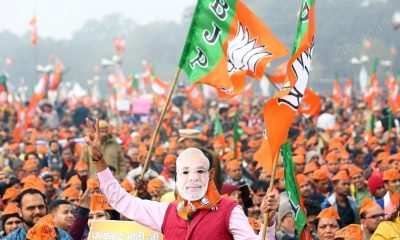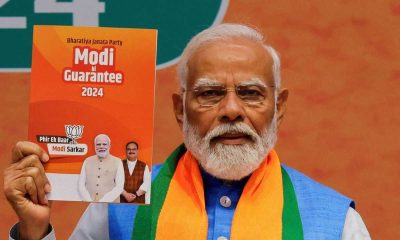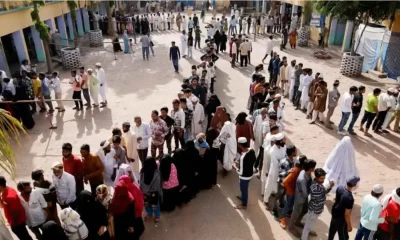Opinion & analysis
It was Mountbatten who took the Kashmir case to UN, not Nehru: Saifuddin Soz
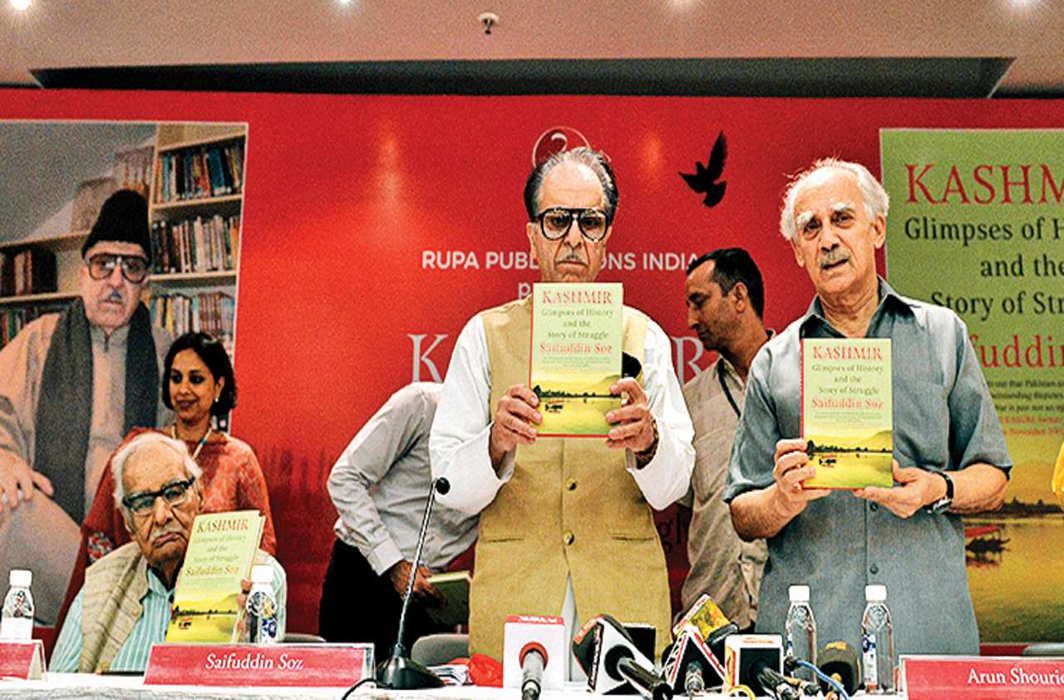
~By Rashme Sehgal
Former union minister Prof Saifuddin Soz book ‘Kashmir: Glimpses of History and the Story of Struggle’ strongly emphasises on the need for Pakistan and India to resolve their long standing disputes particularly over Jammu and Kashmir.
Kashmir may appear to be an intractable problem but there is little doubt in Soz’s mind that if the government launches a strong political initiative with the people in the valley, they will respond with reasonableness and cordiality.
He believes it has become a problem because Union of India could not handle Kashmir properly and entrusted work of political outreach to intelligence agencies who have “small minds” and “know only how to play petty politics”.
- Your book mentions on how Sardar Patel was keen to hand over Kashmir to Pakistan?
- Both Jawaharlal Nehru and Sardar Patel were great sons of India although their approach to politics was different. Both wanted India to be great as per their own perceptions.
Nehru took a lot of interest in Kashmir. Nehru remained close to the National Conference and to Sheikh Abdullah. In 1945, at the Sopore Session of the National Conference when the New Kashmir doctrine was adopted which was to determine their policy for the future, Nehru addressed that session speaking before more than two lakh people.
Sheikh Abdullah kept National Conference away from Muslim League and he kept a distance from the Congress. Nehru addressed that session and that is part of Nehru’s political legacy. Sardar Patel was more pragmatic. In the Partition Council debates he told Liaquat Ali Khan to stop the bickering since till only yesterday we were one country. He told him why are you talking of Hyderabad Deccan since it is not connected to Pakistan by either road or by rail. Take Kashmir instead he said. When Union’s (of India) army landed in Srinagar, the same afternoon Mountbatten was in Pakistan. He had a dinner meeting with Liaquat Ali Khan. He thought Liaquat was preparing for war.
- Was Nehru responsible for taking the Kashmir issue to the UN?
- It was Mountbatten who took the case to UN. It was not Nehru. In my book I quote a letter written by Mountbatten to Nehru which states, “When I first suggested bringing UNO with the dispute, it was in order to achieve the object I have quoted above to stop the fighting and to stop it as soon as possible.’ But no amount of argument could convince Nehru on the correctness of the action that Mountbatten had adopted.
- Why is this fact little known?
- I have done a great deal of research for the book. Sardar Patel offered Kashmir in good faith. I have narrated facts. These are the facts of history.
- But this is contrary to what BJP keeps harping upon insisting that it is Nehru who is to blame the Kashmir problem as he took the issue to the United Nations?
- Both Nehru and Sardar Patel wanted to build India. Sardar Patel was a strong person but he could envisage that Kashmir could be a problem for India. According to the principle of partition, Patel believed it should go to Pakistan but Liaquat Ali Khan was adamant that Deccan and Junagarh should be given to Pakistan. That spoilt the debates in the Partition Council. These are all well researched facts.
In the books written by Shaukat Hayat Ali titled ‘A Nation Lost Its Soul’ describes how when Mountbatten had come to Lahore, the principle of how a state whose subjects make up a majority of a community and the state is contiguous to the adjoining dominion would accede to the adjoining country must be followed. But Liaquat was not willing to give up his claim on Hyderabad leading him to state that Liaquat neither understood history, nor did he understand geography.
- Why has Kashmir become such an intractable problem?
- It has become a problem because Union (of India) over a period of time could not handle Kashmir properly. This is a situation that has been created by so many actors. Political outreach work has been handed over to intelligence agencies. They have small minds. They know only how to play petty politics. They have destroyed the state.
Nehru tried but then August 9, 1953 occurred. (the day Sheikh Abdullah was dismissed from office and put behind bars) From the very beginning intelligence people handled political work in Kashmir. Nehru was opposed to Sheik’s arrest but he was over ruled by his Cabinet. Gandhi had been a bridge of understanding between Nehru and Patel but on his assassination Nehru lost a big support. He lost his vigour to combat communal forces inside and outside parliament.
- Who were some of these small minded intelligence officers?
- There were many of them. I can cite the example of BN Mullick who superseded 30 officers to become intelligence chief. He was very close to the Sardar. Sheikh Abdullah had in his autobiography Aatish-e-China noted how BN Mullick had been sent to Srinagar in the middle of 1949 to report on the situation on the ground in Kashmir. He sent his report to his office in Delhi and Nehru felt happy and sent copies of the report to all embassies. When Sardar Patel came to know, he summoned Mullick and admonished him for sending the report directly to Nehru. Mullick got nervous and told Patel that he had sent the report to the senior officers at the IB.
- You have said good things about Musharraf?
- Musharraf explained to his own generals and to the political establishment, after the loss at Kargil, that India was a much bigger country and Pakistan could not fight and win against it. That is how a peace initiative came about and this formula was accepted by the political establishment. Vajpayee had created an atmosphere of hope by signing the Lahore Declaration. In my book, I merely say that Musharraf said Kashmiris are not in favour of Pakistan. If you give them a choice, they will ask for independence. And I have emphasised that that is not possible. Pakistan must create a situation whereby we can have good relations with India. The five units of (undivided) Kashmir must allow for free movement. The Musharraf formula was very dignified. At the Agra Summit, Vajpayee did not have support of his own colleagues and the intelligence agencies.
Musharraf subsequently built bridges with Manmohan Singh. Manmohan Singh is a sure footed person who proceeds carefully but does not create hype. Singh envisioned a situation where (he hoped) people could have breakfast in Amritsar, lunch in Lahore and dinner in Kabul. But this was not to be because of Pakistan’s own internal security issues. Lal Masjid happened causing violence and unrest all around and then Musharraf had problems with his own judiciary.
- What about the muscular policy of the present government?
Muscular policy will not work here. Kashmiris will get killed but the problem will not be solved. This will mean only more bloodshed. The only thing that will work is a powerful political dialogue. The government must talk to the Hurriyat. They must talk to the angry youth of Kashmir. Start a dialogue with them then move forward to other actors.
When you open a dialogue, then you must perforce speak to the parties that don’t agree with you. That is why speaking to the Hurriyat is important because they vocalise the anger of the youth. When Hurriyat calls for shutdowns, it occurs, so how can people say they do not have a following. In order to move forward, they must talk to people.
- What are your views of Mufti Mohammed and BJP coming together to form the government which then fell apart?
- This was the greatest blunder of Mufti. How could this create harmony in Kashmir? It was the North Pole and the South Pole coming together. BJP gets dictation from RSS. They will their play sectarian politics. The idea of India is not known to them.
But I still say, civil society must also have a dialogue with the RSS.
Opinion & analysis
Never say never again: Nitish Kumar’s expertise at hoodwinking allies shines through!
Nitish Kumar does it again!
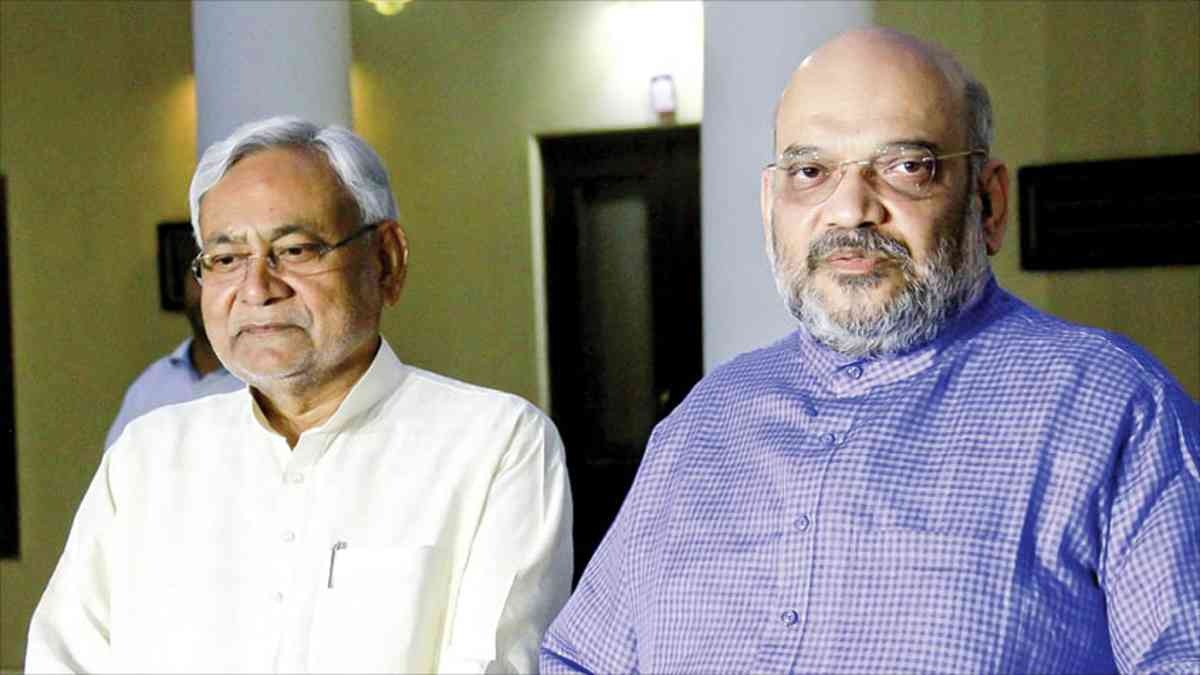
By Vikram Kilpady
Possibly the first state government to fall after the ascendance of the Modi-fied BJP without that party’s hand in the machinations has just shaken up the political landscape in Bihar, and the country. Nitish Kumar has pulled the rug from under the feet of the party. But since history has seen several turns first as a tragedy then as a farce, as noted by Hegel and Marx, Nitish Kumar possibly has the last laugh since he’s done the tragedy-farce duo twice. First, with the Rashtriya Janata Dal and, now, with the BJP, which among its many leaders has one man who gets called Chanakya way too often.
Once the party with a difference, the BJP has mastered the game of overturning elected governments; Madhya Pradesh where a maharajah switched to his aunt’s party, twice in Goa where elected Congress MLAs found faith in a new boss, Maharashtra where the cadre-strong Shiv Sena was ripped apart by a minister’s ambition, Karnataka where Operation Lotus blossomed first and spread its petals across the country.
Soon after the Modi magic of 2014, the dispirited opposition found new hope in the victory of Nitish Kumar and Lalu Yadav in the Bihar elections of 2015. But that was short-lived, Nitish found himself stifled by the ambition of Tejashwi Yadav and changed his mind, walking back to the BJP, which was eager to support him.
The 2020 election had the writing on the wall written in a more legible hand. The BJP won 74 seats, just one short of the party with the most seats, the RJD, which won 75. Nitish Kumar came third with 43 seats. The BJP was gaining at the cost of the Janata Dal United, which beat down Chirag Paswan’s rhetoric but couldn’t manage enough MLAs. The national party cannibalised its partner several times over throughout their association. The symbiosis of the initial years under Vajpayee was becoming a brain and brawn drain for the JDU. The election results were not free from controversy though, with the RJD alleging ballot boxes were changed in the middle of the night. The elections may have been won by the BJP and Nitish Kumar, helped by the image of Prime Minister Narendra Modi, but politics is not just platitudes, it also involves dirty work.
The use of RCP Singh by the BJP pointed at the potential of a Shiv Sena redux in the JDU, prompting the old fox to return to familiar Janata buddies, though once stabbed and all. But what is politics without the choosing of strange bedfellows, even if it borders on promiscuity and worse.
Read Also: Bihar BJP accuses Nitish Kumar of betraying Bihar people
The other angle to see the Bihar turn is from the lens of national politics. The idea of a country rid of the primary opposition party, aka becoming Congressmukt Bharat, has gained popular acceptance among the many for whom democracy is just voting in a new government. The turning of the Congress from its trademark white kurta to black attire was seen as a gimmick by the mainstream media. Far from a gimmick, the party was using what it encountered in Tamil Nadu where it rides on an ally’s stronger connect. The DMK’s parent, the Dravidar Kazhagam and its offshoots, still wears black shirts in protest against the idea of a homogenous India smearing over the vast differences between the country’s many constituents. With Hindutva becoming that all-unifying glue being applied by the BJP across the length and breadth of India, the Congress’s choice of black shows a new savvy.
Covid may have eclipsed the economy but many other slights and the worsening employment situation have India on uneven terrain. The Centre has to hold, but with accountability of successive state governments now enveloped buried in the image of the much-sought-after Strongman, an image that papered over the stark inadequacies of his administration, and won him and his party elections handsomely. The country was wearily dragging its battered economic self for another election some two years away. Nitish Kumar’s somersault has brought realpolitik back into the mix but investing all hope in serial side-switchers can be harmful for one’s emotions and well-being.
To be a rock for the Opposition, Nitish Kumar should not roll. But can old dogs learn new tricks?
Nitish Kumar stakes claim to form new Mahagathbandhan government in Bihar
Bihar Chief Minister Nitish Kumar resigns
India News
Yearender 2021: When hate uncovered its face
Instead of protecting victims of such incidents, the perpetrators not only enjoy immunity from the law, but also the administration in BJP-ruled states punishes victims. The use of false cases and arrests under draconian laws like UAPA are the preferred weapons.
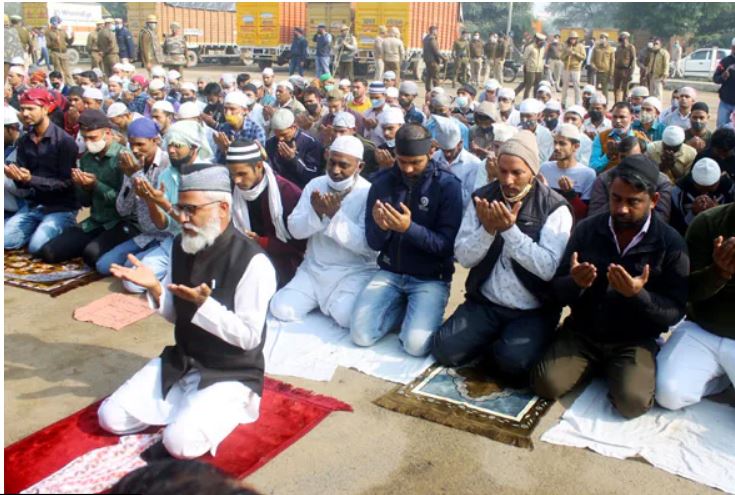
By Mohammad Javed Rasheedi
2021 is about to melt into 2022 in less than 48 hours. Majoritarian politics continued to hold its way over the country this year. But this year, it was not just Muslims but also Christians who felt the heat of Hindutva attacks across India as right-wing Hindu groups waged a culture war against them. Several churches have been attacked and statues of Jesus broken, the latest being in Ambala’s Army Cantonment, the scene of many a Rudyard Kipling work.
December saw targeted hate speeches against minorities. The one at Haridwar saw many participants vow to even take up weapons to redeem their faith by killing non-Hindus. The Hindu right-wing has waged war against Christians accusing them of religious conversion through their missionary work and Muslims for Love Jihad, an Islamophobic trope singling out Muslim men for falling in love with Hindu women and then converting them into Islam. However, such allegations targeting minorities have become a cornerstone of Hindu right-wing nationalism.
The Association for the Protection of Civil Rights, United Against Hate, and United Christian Forum jointly released a fact-finding report highlighting the series of attacks on churches and hate speech against Christians across India. According to the report, India has recorded more than 300 attacks on Christians and worship places within the first nine months of 2021.
Of the 305 incidents, 66 took place in Uttar Pradesh, 47 in Chhattisgarh and at least 32 in Karnataka.
While another report of the United Christian Forum had claimed that India reported more than 400 incidents of violence against Christians across the country. Among those, the incident involved storming churches, burning Christian literature, attacking schools and assaulting worshipers.
However, it is shocking that only 30 FIRs have been registered so far in these cases. On many occasions, restrictions were imposed on people to carry out religious ceremonies.
First on the list of attacks is the one on October 3, where a mob of 250-300 persons barged into a Roorkee church in Uttarakhand and attacked people, destroyed CCTV cameras, and vandalized church premises. Many reports said there were only 12 inside the church for prayers when the attack took place.
Apart from this, the attacks on churches were also reported from BJP-ruled states Haryana, Uttar Pradesh, Madhya Pradesh and Karnataka. And these attacks have taken place over allegations of religious conversion. Christians prayers meetings have also been stopped by the same Hindu mob who had stopped Jumma namaz in the so-called Millennium City, Gurugram. The city also saw an attack on a school’s Christmas celebration.
In the last week of 2021, the bank accounts of Mother Teresa’s Missionaries of Charity were frozen over FCRA claims, West Bengal Chief Minister Mamata Banerjee tweeted about the heartlessness behind the move affecting the charity of the outfit.
Some 22,000 patients and employees have been left without food and medicines, the West Bengal Chief Minister had tweeted.
The Missionaries of Charity was founded in 1950 by the late Mother Teresa, a Catholic nun from Macedonia, who moved to India and took care of the destitute and the poor and won the Nobel Peace Prize in 1979 for her work.
Hate speeches have been curtailed by some norms, keeping them among friends and family. The last week of 2021 saw more public hate speeches in the country. The controversial Dharam Sansad organized in Haridwar, other such events in Delhi and Chattisgarh saw where priests and leaders taking an oath to kill Muslims, and even urged Hindus to arm themselves against the Muslims to make India a Hindu Rashtra.
With next year’s assembly elections in Uttar Pradesh, Uttarakhand, Punjab, Goa and Manipur due shortly, the increase in such hate is an attempt at reviving polarisation.
The violence in Tripura, where VHP hoodlums attacked Muslims and vandalized some of their mosques and Friday prayers disruptions at designated places at Gurugram were also the prime example of rising hate against Muslims.
Anti-Hindu violence in parts of Bangladesh triggered violence in Tripura. The communal riots erupted on October 26 after a rally organized by the Vishwa Hindu Parishad to protest against the attacks on Hindus in Bangladesh turned violent.
The VHP and the Hindu Jagran Manch organized rallies in different parts of the state to protest against the violence in Bangladesh. Later, the VHP and other right-wing groups denied any role in the violence.
The anti-Hindu violence in Bangladesh, which erupted during the Durga Puja festival, was triggered by rumours that the Quran had been insulted in one of the pavilions set up for the celebrations. Seven people were killed, several temples desecrated, and hundreds of houses and business establishments of the Hindu minority were torched.
However, many Muslim groups alleged political conspiracy claiming that the minorities were being targeted in the north eastern state. There were many arrests and some journalists covering the riots in Tripura were also detained. Those who tweeted in favour of Tripura’s Muslims also found themselves being served notices by the state police.
The Uttar Pradesh government had faced severe criticism from the opposition over the killings of Kasganj youth Altaaf in mysterious circumstance. He had been arrested on suspicion of eloping with a Hindu woman. Again, the smoldering love jihad theory. The law and order in Uttar Pradesh, which had earlier won so much praise from PM Modi and other BJP leaders, has been roundly criticized by opposition parties in Uttar Pradesh.
The family of the deceased had alleged that he was tortured by police in the lockup, which led to his death. Police claimed the accused killed himself using the drawstring of his jacket’s hood when he went to the lockup washroom.
Apart from mob lynching, Muslim street vendors in Ahmedabad and some parts of Madhya Pradesh and other parts of the country have been threatened and disallowed from pursuing their livelihood. In Ahmedabad, the Hujarat High Court stepped in to tell off the civic authority to desist from such measures. In Assam, poor peasant families cultivating land for decades were brutally evicted only because they belonged to the Muslim minority. The point-blank shooting of Moinal Haque by police personnel caught on video and the subsequent death dance by a photographer with the remains indeed were a mirror for the crumbling facade of secular India, now overtaken by an aggressive mindless herd mentality spewing hate and violence.
Read Also: Masik Shivratri 2022: Know date, shubh muhurat, puja vidhi, significance
An empty desolate car park outside Sector 37 police station in Gurugram where Muslims had performed Friday prayers for more than a decade turned into a battleground of faith. Hindu right-wing groups staged protests, sloganeered during Friday prayers and held a Govardhan puja at the namaz site just to deny namaz here.
Instead of protecting victims of such incidents, the perpetrators not only enjoy immunity from the law, but also the administration in BJP-ruled states punishes victims. The use of false cases and arrests under draconian laws like UAPA are the preferred weapons.
Haryana news
Dushyant Chautala stood up for farmer’s cause; opposition failed
The Indian farmer constitutes 40 per cent of the country and an even higher percentage of its poor and as the available data points out, is under immense stress.
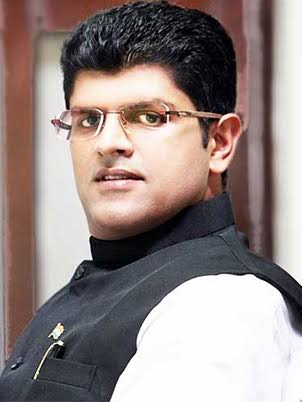
By Prateek Som
The Indian farmer constitutes 40 per cent of the country and an even higher percentage of its poor and as the available data points out, is under immense stress. The modernization of the central farm laws is nothing but an adaptation of provisions which already exist in many states, including Punjab and Haryana. How come the three acts become anti-farmer in some states and why not in many others is something the activists themselves cannot explain.
Big states like Uttar Pradesh, Bihar, Maharashtra, West Bengal, Rajasthan are not even a part of the farmers’ agitation and there is no protest against the central or state government in these states, despite the fact that BJP is not in power in some of these states. More importantly, some agriculturists and several economists have been campaigning for abolishing MSP based procurement as it is unfairly tilted towards a few states like Punjab.
The Central government has neither abolished the MSP nor does it say anything against it in the laws. If, despite this, the impression is being spread that MSP is to be abolished, this is clearly mischievous. The activists are not only spreading the misinformation about the MSP abolition but they are asking for an unreasonable clause in the law for unlimited MSP based procurement which was never a part of the previous laws related to agriculture and APMC acts.
The Indian farm bills are in line with international precedence wherein a number of developing economies have been making changes to their agriculture policies since the 1990s to encourage private sector involvement which would provide a major fillip to the sector. The International Monetary Fund has also backed the recent farm acts as being an important step in the right direction. Despite all the supportive arguments in the favour of the laws, India has seen unprecedented protest in and around the capital as a result of political vendetta.
Politics of Yogendra Yadav and Gurnam Chaduni and its irrelevance to the farmer’s cause
Raising the farmer’s issues should be an act done collectively but the state farmer activists are trying to establish a monopoly in the leadership. They are not even active in all the parts of the state, but targeting only those districts with paddy belt of cropping pattern. Most of them are politically motivated.
In an interview given to NDTV, Yogendra Yadav came out as an aspiring candidate for Haryana CM post and he was advertised as the most fit politician for the position. He formulated his own party, ‘Swaraj’, after being expelled from AAP and lost badly in polls. It is a proof that he lacks mass support. A report by Divya Bhaskar states that farmer leader Gurnam Chaduni was accused of teaming up with political parties like Congress, AAP, SAD and some independent leaders and getting into a deal worth Rs 10 crore to topple the Khattar government in Haryana in return of Congress ticket for elections. There are allegations that Chaduni is collecting funds out of the collection drive for protests and hiding the funds from other leaders. He was also blamed for instigating farmers to disrupt the January 26 celebrations at the Red Fort. Haryana CM Khattar held Chaduni responsible for instigating the farmers that led to clashes between farmers and police at Karnal just before the Kisan Mahapanchayat programme. As a result of his politically motivated efforts, Chaduni was suspended by Samyukt Kisan Morcha from meeting politicians across country. In the 2019 assembly elections, Chaduni contested from Ladwa as an Independent candidate, but suffered a heavy defeat, garnering only 1,307 votes and losing his deposit.
Yogendra Yadav and Gurnam Chaduni are mere examples of how election failures like themselves are trying to garner the support of the commoners for their own political resurrection. The claim of being a leader of the farmers is in contravention with the inconsiderable support both Yadav and Chaduni got in the polls. The Shiromani Akali Dal that left the NDA government in the pursuance of state elections and under the disguise of farmer’s demands has made zero impact on the political ground of Punjab. Their biases can not only be seen from their actions but their cause and concern for two states out of 28. The threat posed by leaders like these to the democratic process of passing of a bill can be seen through the factual analysis of what the laws actually say versus the intentional misconceptions spread by such leaders.
Since an unlimited MSP based procurement is not in the law even today, it is not clear how this is even an issue. More importantly, putting this in the law means India will get tied to distortions that MSP based prices cause in perpetuity. The government has made it clear that procurement at MSP will continue and also that the mandis will not stop functioning. Farmers will have the option to sell their produce at other places in addition to the mandis. It is worth noting that only 6% of farmers actually sell their crops at MSP rates, according to the 2015 Shanta Kumar Committee’s report using National Sample Survey data. There are fears that contract farming will lead to land loss of the small and marginal farmers to big corporates. However, adequate protection of land ownership is in place to protect farmer interests. The act explicitly prohibits any sponsor firm from acquiring the land of farmers – whether through purchase, lease or mortgage. The point to note is that contract cultivation is voluntary in nature and farmers cannot be forced into an agreement.
How Dushyant Chautala is taking initiatives for farmers
Dushyant Chautala is the only state leader who has met Central leaders regarding the farmer demands – Prime Minister, Home Minister, Agriculture Minister along with other cabinet ministers Nitin Gadkari and Piyush Goyal. No other leader in India has met them specifically for farmers’ demands. That shows the concern and responsibility on the part of the JJP leader who is a leader of the masses.
In April 2020, Deputy CM Chautala addressed that the state government will procure the crops of the farmers in a better way while saving the state from the corona epidemic. As a result of this, even in the pandemic situation, mandis have been increased to 162 from 67 for the purchase of mustard at MSP. Haryana is the only state across the country which has started procurement of mustard crop in this pandemic. In November 2020, Dushyant assured the farmers that government will buy every grain of the crop. He made procurements for non-MSP crops to get the rate of MSP crops. He also announced formation of women Self-Help Groups in all villages on the lines of successful initiative in Hisar, to increase employment opportunities for women and showcase their talent at international level.
In February 2021, Dushyant made the announcement to buy 6 crops including wheat, mustard, pulses, sunflower, gram at MSP, barley is included for the first time. Haryana is the first state to offer MSP for barley. Every farmer is to be registered on the ‘Meri Fasal Mera Byora’ portal at MSP and payment amount will arrive in the farmer’s account within 48 hours. Along with recent announcements, the schemes like Mukhyamantri Parivar Samman Nidhi Scheme, Haryana Agricultural Machinary Grant Scheme, Pragatishil Kisan Samman Yojana, Pragatishil Kisan Trainer and Kisan Mitra Scheme to promote the inclusive growth of farmers in Haryana.
The main agenda of ongoing agitations
Amidst all the chaos, the agitations by activists like Yogendra Yadav and Gurnam Chaduni are for targeting Deputy CM Dushyant Chautala. It is a matter of record that many times they carried protests outside his residence and their intention and cause are suspicious to the core as they did not target any other leader in power like this.
The agitations in Haryana are mainly against the JJP and specifically targeted towards the leadership of Deputy CM Dushyant Chautala. The attempts of the farmer leaders to make Dushyant Chautala resign from the government are nothing but petty politics to destabilize the state government. If the threat to farmers is real, why the cause of the farmers is not taken up by the farmers from masses than some farmers from selected areas and that too under the leadership of politically motivated specific leaders only who have ties with the parties who are eyeing the upcoming elections?
The high-pitched farmer agitation is not just based on incorrect perceptions of what the new farm laws will result in – the abolition of APMC mandis and MSP-based procurement – they are also not about protecting the farmer in the long run. The agitation is purely an attempt to corner the stable functioning state government, to boost the sagging political fortunes of the activist leaders by deliberately misleading farmers, to run a personal vendetta against a young and dynamic leadership of Dushyant Chautala who is making efforts for the farmers and to give chance to Congress to come in power. That is why, before the activists decided to fuel the agitation, they focused on batting for spreading misinformation, have nothing to say about non-MSP crops/livestock in the state and have no future agenda for the inclusive growth and development of farmers. And to make the matters worse, they are trying to provoke the masses against the people in power for their vested political interests.
The author is an Advocate in Supreme Court of India and National Spokesperson of Jannayak Janta Party
-

 Entertainment19 hours ago
Entertainment19 hours agoDo Aur Do Pyaar social media review: Social media users say Vidya Balan, Pratik Gandhi deliver standout performances in this adorable film
-
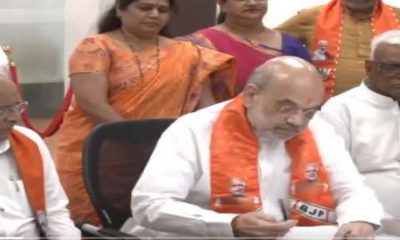
 2024 Lok Sabha Elections20 hours ago
2024 Lok Sabha Elections20 hours agoLok Sabha elections 2024: Amit Shah files nomination from Gandhinagar
-

 Entertainment21 hours ago
Entertainment21 hours agoYami Gautam starrer Article 370 releases on Netflix today
-
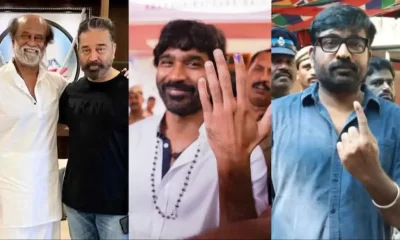
 2024 Lok Sabha Elections22 hours ago
2024 Lok Sabha Elections22 hours agoKamal Haasan, Rajinikanth, Vijay Sethupathi, Dhanush vote in Chennai
-
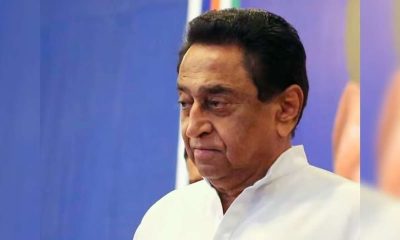
 2024 Lok Sabha Elections16 hours ago
2024 Lok Sabha Elections16 hours agoDeserted by key supporters, the Kamal Nath story looks set to wind to an end in Chhindwara
-
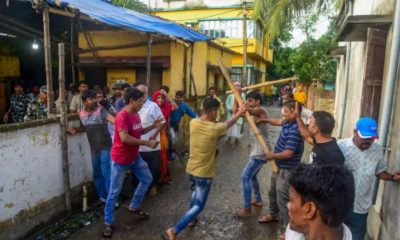
 2024 Lok Sabha Elections22 hours ago
2024 Lok Sabha Elections22 hours agoLok Sabha elections 2024: TMC, BJP workers clash in West Bengal’s Cooh Behar ahead of voting
-

 Entertainment18 hours ago
Entertainment18 hours agoAditya Roy Kapur, Sara Ali Khan’s Metro In Dino to release this November
-

 2024 Lok Sabha Elections23 hours ago
2024 Lok Sabha Elections23 hours agoLok Sabha elections 2024: Google Doodle marks the start of polls with index finger voting symbol





